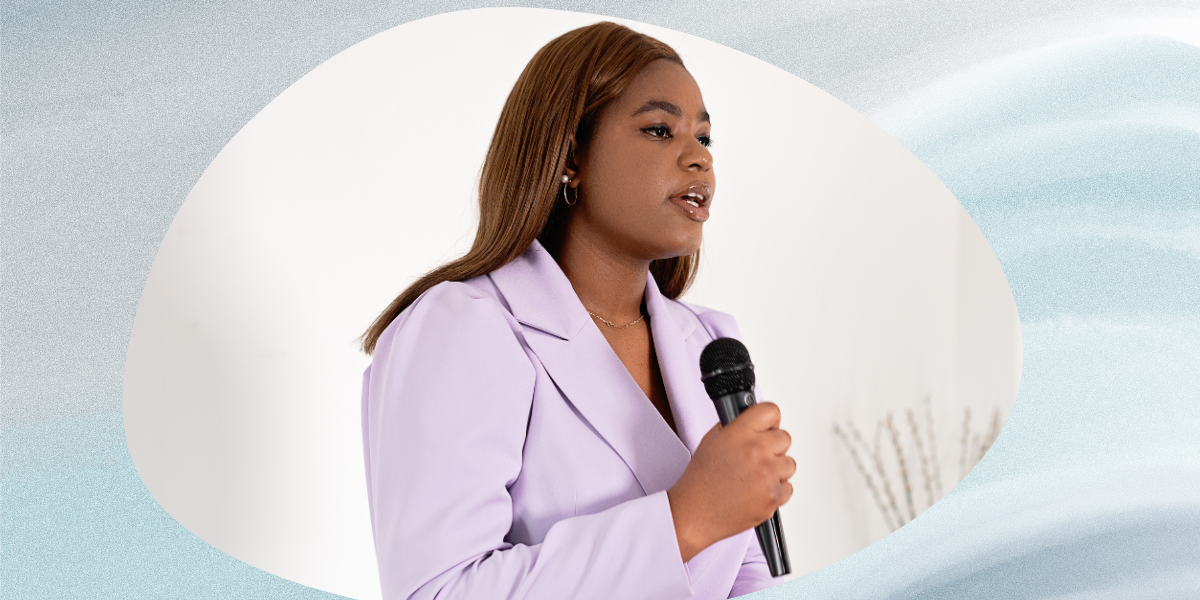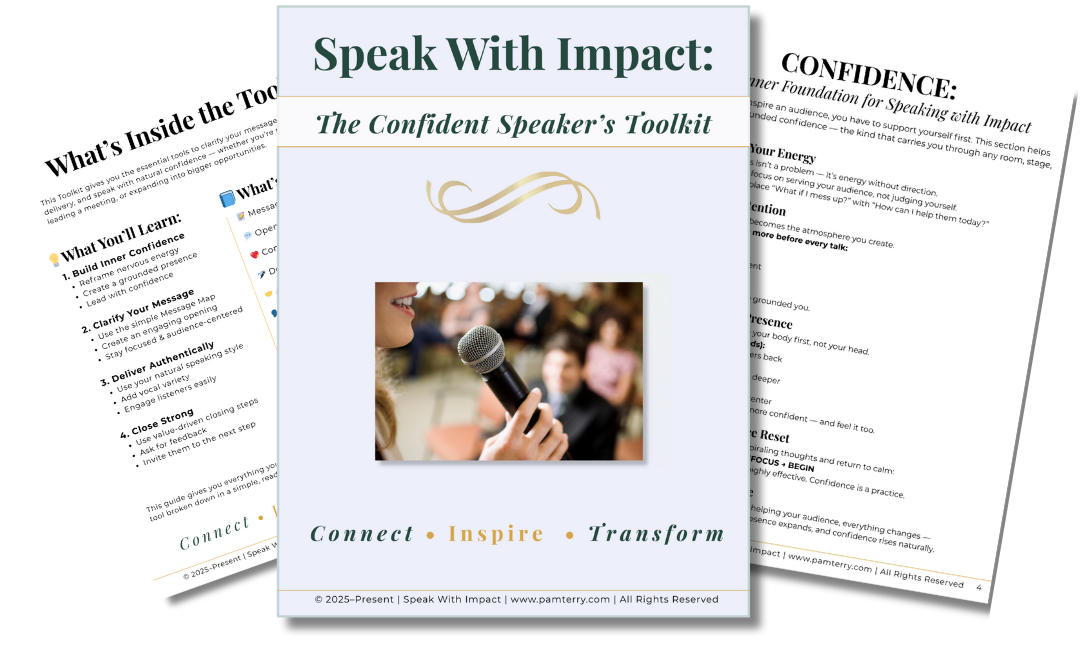When you have worked hard to prepare your talk, you want to impress your audience, leave an impact, and quite possibly change lives. The worst thing you can do is dilute your message with words and phrases you should avoid. To assist you with a great talk you work hard to create, avoid these 35 words and phrases to be more confident (and to make your talk even greater). Keep in mind that you may need to make an exception and will need to use one or more of these at times.
This knowledge isn't just about being confident—it's also about sounding confident! By steering clear of certain words and phrases, you're not only bolstering your self-assurance but also creating that know-like-trust factor.
- “A little bit” Avoid saying, “I’d like to talk a little bit about…” It dilutes what you’re saying. Get to the point by starting with “Let’s discuss the….”
- “I’ll be talking about…” Variations of this phrase include: “My topic is…” I’ve been asked to speak about…” These phrases are all unnecessary and dilute your message. They also put the focus on you when the focus should be on the audience.
- "Um" and "Uh” Reduce usage of filler words and phrases such as "Um," and "Uh.” Saying these filler words over and over again detracts from your message. Related blog post: Eradicate Filler Words & Captivate Your Audience.
- "You know" or “You know, like” Saying “you know” or “you know, like” also detracts from your message. The message you end up giving is that you have not prepared and don’t know your material.
- “Basically” This word can make you sound like you're oversimplifying complex ideas. Instead, strive for clarity by explaining concepts thoroughly. (I say basically a lot! Gotta work on this one.)
- “So” Be sure not to start your talk with “So.” It’s ok to use “so” to connect to a previous thought but be careful not to use it too much.
- “Right?” Saying, “Right?” confers that you aren’t sure of what you are saying. Best to eliminate this one.
- “Game-Changer” Is it really? If it is truly a “game-changer,” fine. But if not, avoid using this word. Alternatively, try some of the suggestions here: Word Hippo. Always opt for conciseness.
- “Take it to the next level.” Shoot me now. So tired of hearing this phrase as I am sure many others are as well. For some alternatives, go to: Word Hippo. Always opt for clear and specific language.
- “At the end of the day” Here we go again. Find great alternatives here: Word Hippo. Be concise and clear.
- Jargon Avoid industry-specific terms that your audience might not understand. Explain complex ideas in simple terms.
- “Don’t” Steer clear of the word “Don’t” and the phrase “Don’t forget.” For example, when you say, “Don’t think of an elephant,” you think of an elephant. Instead of saying “Don’t forget to…,” say “Remember to…” Maintain a positive and confident tone. Related blog post: The Power of Positive Framing.
- "I think," "I believe," or "In my opinion." Present your ideas with authority. Related blog post: 2 Proven Strategies for Establishing Authority and Credibility in Your Presentations.
- Long-winded sentences Keep it concise. Too much information, rambling, or using overly complex sentences can lose your audience's attention. Related blog post: The Power 0f Conciseness in Public Speaking.
- “I’m sorry” “Sorry if” Sorry for” Unless you've made a genuine mistake, avoid saying "I'm sorry" or any of its variations especially excessively. Apologizing unnecessarily can undermine your confidence.
- "I'm not good at this" or "I'll probably mess up." “I’m not good at public speaking.” “I’ve never done this before.” “I think I’ve bored you enough.” Replace self-doubt and self-deprecating talk with positive affirmations. Related blog post: The Power of Positive Framing
- “Literally” Overusing this word can dilute its impact. Reserve it for situations where something truly happened exactly as described.
- “Sort of” or “Kind of” These 2 phrases weaken your statements and can make you seem unsure. Replace them with more definitive language.
- "And everything like that." This is a phrase that can leave your audience confused. What are you referring to? Best to say what else there is instead of saying this phrase or eliminate it.
- “What I’m trying to say is…” Oh boy. Yeah, don’t ever say this in a presentation. Please.
- “In my humble opinion” While humility is admirable, this phrase can undermine your confidence. Express your viewpoint without downplaying it. Consider saying, “in my professional opinion.”
- “I guess” or “I suppose” These phrases suggest uncertainty. If you have a viewpoint, state it confidently without hedging.
- “To be honest” or “Honestly” This implies that you might not always be truthful, which can erode trust. Be honest in all your communications without announcing it.
- “Just” Overusing "just" can diminish the importance of your message. For instance, instead of saying "I just wanted to add," simply say, "I want to add."
- “I'm not an expert, but...” This phrase undermines your credibility. If you're not an expert, why should the audience listen to you? Share your knowledge without prefacing it with self-doubt.
- “Bear with me” When there’s a technical difficulty, have a back up plan instead of saying this phrase. Be prepared.
- “I'll keep it short.” This can set low expectations for your speech. Be confident in your ability to deliver a concise and engaging presentation.
- “I don't know if you can see this, but...” Assume that your audience can see what you're presenting. Avoid this phrase to maintain a confident tone.
- “It's complicated.” While some topics are complex, strive to break them down into understandable parts rather than dismissing them.
- “Moving right along…” This sounds like you’re not prepared and are stumbling to the next point. You will sound and be confident when you have prepared transitions throughout your talk.
- “I think we covered everything.” Be more definitive in your conclusion. For one thing, you couldn't have possibly covered everything. Your the expert and have a ton of knowledge. Avoid this phrase and any semblance of it.
- “I'm not sure if this makes sense.” Don't cast doubt on your audience's ability to comprehend. Instead, ask if there are any questions or provide clarification if needed. You must be sure that you are making sense.
- “Know what I mean?” This phrase makes you sound uncertain. Best to eliminate it.
- “I’m running out of time, so I’ll be quick.” Instead of bringing attention to the shortage of time and lack of preparation, practice your presentations so that you stay within the allotted time. If you are given less time than what was arranged, be prepared to skip some material. Your audience will never know (unless you tell them, but don't).
- “That’s all I have.” Never end a talk this way. Prepare a strong close that leaves your audience wanting more. Be prepared to summarize the value and the key takeaways for your audience.
Do you have any must-have words or phrases to add to the list? I am sure there are more!




Brilliant and noted, thank you
Thank you David!